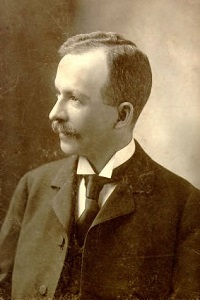The Wife of His Youth, Part 2
Written Text
“At length I saw a lady within call,
Stiller than chisell’d marble, standing there;
A daughter of the gods, divinely tall,
And most divinely fair.”
He marked the verse, and turning the page read the stanza beginning:
“O sweet pale Margaret,
O rare pale Margaret.”
He weighed the passage a moment, and decided that it would not do. Mrs. Dixon was the palest lady he expected at the ball, and she was of a rather ruddy complexion, and of lively disposition and buxom build. So he ran over the leaves until his eye rested on the description of Queen Guinevere:
“She seem’d a part of joyous Spring;
A gown of grass-green silk she wore,
Buckled with golden clasps before;
A light-green tuft of plumes she bore
Closed in a golden ring.
“She look’d so lovely, as she sway’d
The rein with dainty finger-tips,
A man had given all other bliss,
And all his worldly worth for this,
To waste his whole heart in one kiss
Upon her perfect lips.”
As Mr. Ryder murmured these words audibly, with an appreciative thrill, he heard the latch of his gate click, and a light footfall sounding on the steps. He turned his head, and saw a woman standing before his door.
She was a little woman, not five feet tall, and proportioned to her height. Although she stood erect, and looked around her with very bright and restless eyes, she seemed quite old; for her face was crossed and recrossed with a hundred wrinkles, and around the edges of her bonnet could be seen protruding here and there a tuft of short gray wool. She wore a blue calico gown of ancient cut, a little red shawl fastened around her shoulders with an old-fashioned brass brooch, and a large bonnet profusely ornamented with faded red and yellow artificial flowers. And she was very black, —so black that her toothless gums, revealed when she opened her mouth to speak, were not red, but blue. She looked like a bit of the old plantation life, summoned up from the past by the wave of a magician’s wand, as the poet’s fancy had called into being the gracious shapes of which Mr. Ryder had just been reading.
He rose from his chair and came over to where she stood.
“Good-afternoon, madam,” he said.
“Good-evenin’, suh,” she answered, ducking suddenly with a quaint curtsy. Her voice was shrill and piping, but softened somewhat by age. “Is dis yere whar Mistuh Ryduh lib, suh?” she asked, looking around her doubtfully, and glancing into the open windows, through which some of the preparations for the evening were visible.
“Yes,” he replied, with an air of kindly patronage, unconsciously flattered by her manner, “I am Mr. Ryder. Did you want to see me?”
“Yas, suh, ef I ain’t ‘sturbin’ of you too much.”
“Not at all. Have a seat over here behind the vine, where it is cool.
What can I do for you?”
“‘Scuse me, suh,” she continued, when she had sat down on the edge of a chair, “‘scuse me, suh, I ‘s lookin’ for my husban’. I heerd you wuz a big man an’ had libbed heah a long time, an’ I ‘lowed you would n’t min’ ef I ‘d come roun’ an’ ax you ef you ‘d ever heerd of a merlatter man by de name er Sam Taylor ‘quirin’ roun’ in de chu’ches ermongs’ de people fer his wife ‘Liza Jane?”
Mr. Ryder seemed to think for a moment.
“There used to be many such cases right after the war,” he said, “but it has been so long that I have forgotten them. There are very few now. But tell me your story, and it may refresh my memory.”
She sat back farther in her chair so as to be more comfortable, and folded her withered hands in her lap.
“My name ‘s ‘Liza,” she began, “‘Liza Jane. W’en I wuz young I us’ter b’long ter Marse Bob Smif, down in ole Missoura. I wuz bawn down dere. Wen I wuz a gal I wuz married ter a man named Jim. But Jim died, an’ after dat I married a merlatter man named Sam Taylor. Sam wuz free-bawn, but his mammy and daddy died, an’ de w’ite folks ‘prenticed him ter my marster fer ter work fer ‘im ‘tel he wuz growed up. Sam worked in de fiel’, an’ I wuz de cook. One day Ma’y Ann, ole miss’s maid, came rushin’ out ter de kitchen, an’ says she, ‘‘Liza Jane, ole marse gwine sell yo’ Sam down de ribber.’
“‘Go way f’m yere,’ says I; ‘my husban’ ‘s free!’
“‘Don’ make no diff’ence. I heerd ole marse tell ole miss he wuz gwine take yo’ Sam ‘way wid ‘im ter-morrow, fer he needed money, an’ he knowed whar he could git a t’ousan’ dollars fer Sam an’ no questions axed.’
“W’en Sam come home f’m de fiel’ dat night, I tole him ‘bout ole marse gwine steal ‘im, an’ Sam run erway. His time wuz mos’ up, an’ he swo’ dat w’en he wuz twenty-one he would come back an’ he’p me run erway, er else save up de money ter buy my freedom. An’ I know he ‘d ‘a’ done it, fer he thought a heap er me, Sam did. But w’en he come back he didn’ fin’ me, fer I wuzn’ dere. Ole marse had heerd dat I warned Sam, so he had me whip’ an’ sol’ down de ribber.
“Den de wah broke out, an’ w’en it wuz ober de cullud folks wuz scattered. I went back ter de ole home; but Sam wuzn’ dere, an’ I could n’ l’arn nuffin’ ‘bout ‘im. But I knowed he ‘d be’n dere to look fer me an’ had n’ foun’ me, an’ had gone erway ter hunt fer me.
“I ‘s be’n lookin’ fer ‘im eber sence,” she added simply, as though twenty-five years were but a couple of weeks, “an’ I knows he ‘s be’n lookin’ fer me. Fer he sot a heap er sto’ by me, Sam did, an’ I know he ‘s be’n huntin’ fer me all dese years, —‘less’n he ‘s be’n sick er sump’n, so he could n’ work, er out’n his head, so he could n’ ‘member his promise. I went back down de ribber, fer I ‘lowed he ‘d gone down dere lookin’ fer me. I ‘s be’n ter Noo Orleens, an’ Atlanty, an’ Charleston, an’ Richmon’; an’ w’en I ‘d be’n all ober de Souf I come ter de Norf. Fer I knows I ‘ll fin’ ‘im some er dese days,” she added softly, “er he ‘ll fin’ me, an’ den we ‘ll bofe be as happy in freedom as we wuz in de ole days befo’ de wah.” A smile stole over her withered countenance as she paused a moment, and her bright eyes softened into a far-away look.
This was the substance of the old woman’s story. She had wandered a little here and there. Mr. Ryder was looking at her curiously when she finished.
“How have you lived all these years?” he asked.
“Cookin’, suh. I ‘s a good cook. Does you know anybody w’at needs a good cook, suh? I ‘s stoppin’ wid a cullud fam’ly roun’ de corner yonder ‘tel I kin git a place.”
“Do you really expect to find your husband? He may be dead long ago.”
She shook her head emphatically. “Oh no, he ain’ dead. De signs an’ de tokens tells me. I dremp three nights runnin’ on’y dis las’ week dat I foun’ him.”
“He may have married another woman. Your slave marriage would not have prevented him, for you never lived with him after the war, and without that your marriage does n’t count.”
“Would n’ make no diff’ence wid Sam. He would n’ marry no yuther ‘ooman ‘tel he foun’ out ‘bout me. I knows it,” she added. “Sump’n ‘s be’n tellin’ me all dese years dat I ‘s gwine fin’ Sam ‘fo’ I dies.”
“Perhaps he ‘s outgrown you, and climbed up in the world where he would n’t care to have you find him.”
“No, indeed, suh,” she replied, “Sam ain’ dat kin’ er man. He wuz good ter me, Sam wuz, but he wuz n’ much good ter nobody e’se, fer he wuz one er de triflin’es’ han’s on de plantation. I ‘spec’s ter haf ter suppo’t ‘im w’en I fin’ ‘im, fer he nebber would work ‘less’n he had ter. But den he wuz free, an’ he did n’ git no pay fer his work, an’ I don’ blame ‘im much. Mebbe he ‘s done better sence he run erway, but I ain’ ‘spectin’ much.”
“You may have passed him on the street a hundred times during the twenty-five years, and not have known him; time works great changes.”
She smiled incredulously. “I ‘d know ‘im ‘mongs’ a hund’ed men. Fer dey wuz n’ no yuther merlatter man like my man Sam, an’ I could n’ be mistook. I ‘s toted his picture roun’ wid me twenty-five years.”
“May I see it?” asked Mr. Ryder. “It might help me to remember whether I have seen the original.”
As she drew a small parcel from her bosom he saw that it was fastened to a string that went around her neck. Removing several wrappers, she brought to light an old-fashioned daguerreotype in a black case. He looked long and intently at the portrait. It was faded with time, but the features were still distinct, and it was easy to see what manner of man it had represented.
He closed the case, and with a slow movement handed it back to her. “I don’t know of any man in town who goes by that name,” he said, “nor have I heard of any one making such inquiries. But if you will leave me your address, I will give the matter some attention, and if I find out anything I will let you know.”
She gave him the number of a house in the neighborhood, and went away, after thanking him warmly.
He wrote the address on the fly-leaf of the volume of Tennyson, and, when she had gone, rose to his feet and stood looking after her curiously. As she walked down the street with mincing step, he saw several persons whom she passed turn and look back at her with a smile of kindly amusement. When she had turned the corner, he went upstairs to his bedroom, and stood for a long time before the mirror of his dressing-case, gazing thoughtfully at the reflection of his own face.
.................
“The Wife of His Youth,” by Charles Waddell Chesnutt
Read by Roderick Davis
Audio Engineer Chris Pope
Directed by Walter Evans
Copyright Georgia Regents University 2012 All Rights Reserved







